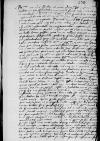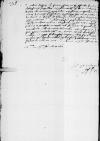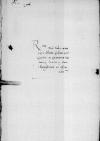List #1720
Ioannes DANTISCUS do Tiedemann GIESELöbau (Lubawa), 1537-09-23
Rękopiśmienne podstawy źródłowe:
Publikacje:
| ||||||||||||||||||
Tekst + aparat krytyczny + komentarz Zwykły tekst Tekst + komentarz Tekst + aparat krytyczny Ekscerpty dotyczące podróży Dantyszka
Reverendissimo Domino
Reverendissime mi Domine, Frater et Amice carissime et written over ac⌈acetet written over ac⌉ observandissime. Salutem cum omnis felicitatis incremento fraternique amoris mei commendatione.
Binis Dominationis Vestrae Reverendissimae litteris, quas heri accepi, respondebo, communi cum Dominatione Vestra Reverendissima laeticia et hospitalitate occupatus, in compendio. Primum omnium Deo Omnipotenti laus, honor, gloria atque omnis graciarum actio, qui secundum suam clementem voluntatem ac misericordiam
cf. Ter. Ad. 480 nunc huius periclo fit, ego in portu navigo; Adagia 1526 No. 46 In portu navigare ⌊negotia nostra perduxit salva in portumcf. Ter. Ad. 480 nunc huius periclo fit, ego in portu navigo; Adagia 1526 No. 46 In portu navigare ⌋. Nostrum igitur iam erit curare, ut
cf. Rhet. Her. 3. 8. 22-24 virtutibus uti neminem posse, qui suas rationes in tuto non conlocarit: ne deos quidem esse auxilio is, qui se inconsulto in periculum mittant ⌊in tuto locaricf. Rhet. Her. 3. 8. 22-24 virtutibus uti neminem posse, qui suas rationes in tuto non conlocarit: ne deos quidem esse auxilio is, qui se inconsulto in periculum mittant ⌋ possint. Qua in re nullam patiar a me desiderari diligentiam, gratiamque, quantum possum, pro cura ac solicitudine pro me habita non solum agam, sed totis viribus referam Dominationi Vestrae Reverendissimae. Quam impense oro, sive
Quod Dominatio Vestra Reverendissima scribit de consensu
Non potui mihi temperare, quin hominis idiotae et stupidi[1], cuius me revera miseret, tantum abest ut indigner, fatuas et impudentes litteras <Reverendissimae Dominationi Vestrae mitterem>. Quibus se nescio quem principem scribit fuisse
 BCz, 244, p. 236
BCz, 244, p. 236
ms 1 [acta] paper damaged⌈actams 2 3 4 acta,
ms 1 [acta] paper damaged⌉. Sed iam a scriptione avocor ad ecclesiam. Si quid aliud
ms 2 3 4 mihi,
ms 1 m[ihi] paper damaged⌈mihims 2 3 4 mihi,
ms 1 m[ihi] paper damaged⌉ inciderit rebus nostris commodum aut necessarium, ms 2 3 4 scribam,
ms 1 scrib[am] paper damaged⌈scribamms 2 3 4 scribam,
ms 1 scrib[am] paper damaged⌉ per proprium nuntium Dominationi Vestrae Reverendissimae. Quam diutissime optime valere et esse felicissimam cupio, utque fratres nostros omnes, quibus per oportunitatem gratias sum habiturus, meo nomine salvere iubeat, oro.
Dominationis Vestrae Reverendissimae frater integerrimus


